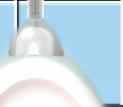|
|
 |
 |
 |
History |
 |
|
| Peeball Through The Ages |
|
No-one knows when or where the sport of Peeball began. What is clear however, is that the growth of the beverage
industry and the invention of the modern day urinal in 1891 sent the popularity of the once aristocratic game of
Peeball soaring. The history of the sport prior to this date is sketchy, although there is much evidence to
suggest that England had a thriving peeball community in Tudor times; AJP Taylor, no less, suggesting that
'Greensleeves' is a derivation of Green Pees.
By the late 1840s in Great Britain, County Peeball was a fiercely competitive domain, with gentleman athletes
like W.C. Grace and Sir Harold Slashman commanding huge followings. The Battle of the Roses between Lancashire
and Yorkshire in 1884 was the third biggest grossing sporting event of the decade, with minor riots erupting in
Leeds after a potentially match-winning stand by Dr. James Wettbotham was disqualified for illegal use of
the hands. Whether he dropped his monocle into the playing area deliberately was one question, but why he stooped
to pick it up mid-stand has never really been resolved. 50 years later, the decision was still being argued
about in lavatories throughout the North.
|
|
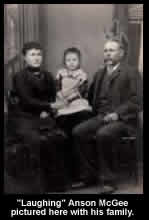
 In the United States the early years of Peeball witnessed
tremendous discrimination against black competitors. Great hosemen such as Sweet Pee Brown and Jackson
'Mississippi' Rivers were regularly overlooked for championship matches in favour of inferior white opposition.
It was only when Charlie 'The Blaster' Jackson publicly challenged the reigning white US champ and noted bigot
Anson McGee that there was finally a black champion. Jackson's endurance stand of six minutes, 13 seconds
(achieved with Whites Only ball, allegedly borrowed from a local child) remained the world's best until
1939, nearly thirty years later.
In the United States the early years of Peeball witnessed
tremendous discrimination against black competitors. Great hosemen such as Sweet Pee Brown and Jackson
'Mississippi' Rivers were regularly overlooked for championship matches in favour of inferior white opposition.
It was only when Charlie 'The Blaster' Jackson publicly challenged the reigning white US champ and noted bigot
Anson McGee that there was finally a black champion. Jackson's endurance stand of six minutes, 13 seconds
(achieved with Whites Only ball, allegedly borrowed from a local child) remained the world's best until
1939, nearly thirty years later.
|
|
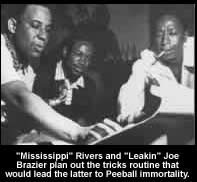 Peeball controversy wasn't confined to the U.S. During the English team's 1931 tour of Australia, their captain
Douglas Sardine's abrasive 'Shoeline' tactic almost caused diplomatic relations between the two countries to be
suspended. Consisting of deliberately spilling stray sprays around the ankles of the Australian team, especially
the great Don 'Iron Urethra' Hickles, in one infamous episode the Australian captain, Percy 'Pinkie' Pinkerton
accused Yorkshireman Albert 'Punisher' Smedley, of deliberately urinating in his eye. It took a telegram from
King George with the words 'STEADY ON STOP THIS JUST ISNT PEEBALL' to stop the English team being deported
from the colony.
Peeball controversy wasn't confined to the U.S. During the English team's 1931 tour of Australia, their captain
Douglas Sardine's abrasive 'Shoeline' tactic almost caused diplomatic relations between the two countries to be
suspended. Consisting of deliberately spilling stray sprays around the ankles of the Australian team, especially
the great Don 'Iron Urethra' Hickles, in one infamous episode the Australian captain, Percy 'Pinkie' Pinkerton
accused Yorkshireman Albert 'Punisher' Smedley, of deliberately urinating in his eye. It took a telegram from
King George with the words 'STEADY ON STOP THIS JUST ISNT PEEBALL' to stop the English team being deported
from the colony.
|
|
|
The war years were lean times for Peeball, with countless giants of the game perishing on the world's
battlefields. One aside is that Barnes Wallace allegedly developed his idea for the bouncing bomb after
watching a group of young boys play Peeball in an alleyway near his home. His estate disputes this conjecture.
|
|
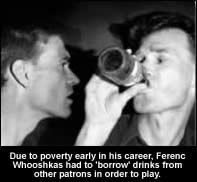 The 1950s were a golden age for Peeball, with Ideal Standard Madrid dictating how all future European teams
would be judged. By combining the very best Spanish talent with defected Hungarian genius Ferenc 'The Slashing
Major' Whooshkas, Ideal won five consecutive European Championships. The 1961 final, watched by over 12,000
Glaswegians in The Horseshoe Bar, has often been described as the greatest game of Peeball ever played, and
inspired an entire generation of British players.
The 1950s were a golden age for Peeball, with Ideal Standard Madrid dictating how all future European teams
would be judged. By combining the very best Spanish talent with defected Hungarian genius Ferenc 'The Slashing
Major' Whooshkas, Ideal won five consecutive European Championships. The 1961 final, watched by over 12,000
Glaswegians in The Horseshoe Bar, has often been described as the greatest game of Peeball ever played, and
inspired an entire generation of British players.
Six years later, England took the World Cup for the first and last time. A late Franz Beckenpecker Windmill in
the tricks round took the already nerve-jangling match into extra time. Once the Russian judge gave a the most
controversial decision in the game's history (did Geoff Spurt's ball really dissolve or was it obscured by a
pineapple chunk?), minutes later
the words, "There's people on the bog, they think it's all over. It is now!" became enshrined in every
Englishman's heart.
|
|
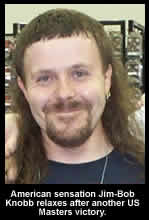 The 70s and 80s were troubled years for Peeball. Despite some classic battles, both decades were tainted by
accusations of cheating levelled at the Eastern Block Peeball powerhouses. Tales of systematic drug taking,
bladder inflation and lightened balls were all commonplace but paled with the revelation that 1976 individual
endurance champion, Oleg Lavitov, had been injected with camel hormones to increase his liquid capacity.
The 70s and 80s were troubled years for Peeball. Despite some classic battles, both decades were tainted by
accusations of cheating levelled at the Eastern Block Peeball powerhouses. Tales of systematic drug taking,
bladder inflation and lightened balls were all commonplace but paled with the revelation that 1976 individual
endurance champion, Oleg Lavitov, had been injected with camel hormones to increase his liquid capacity.
Thanks to the rigorous testing procedures of the International Peeball Federation (IPF) and the invention of
Power Peeball in 1991, the 1990s were a new golden age for the sport. Global superstars like Jim-Bob Knobb,
Luis Peego and England's own 'Tricky' Mickey Bowen now combine five figure salaries. Despite the lack of TV
or media support, all over the world more and more athletes are taking up Peeball.
|
|
|
The launch of Power Peeball in the UK and peeball.com is merely the beginning of a new era for the sport. At
the IPF we're aiming to make the 21st Century the greatest era ever for Peeball. For all the results, match
reports and details of how to get started on the road to glory, stay on-line.
|
 |
|
 |
|

